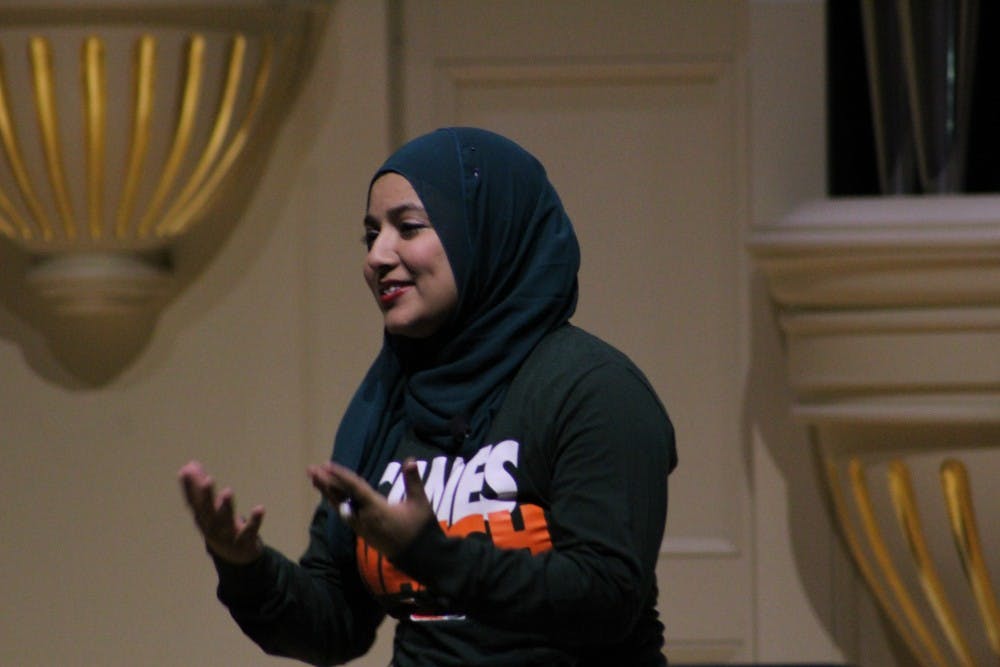“Do you know what it’s like to represent 1 billion people every day when you walk out of your house?”
That was the start of an hour-and-a-half long performance by three Muslim women relaying their everyday experiences living in the United States.
The three women — Sahar Ullah, Kamilah Pickett and Rafiah Jones — presented varying monologues about the treatment they receive from non-Muslims, how they interact within their faith communities and how they respond to national incidences involving Muslims.
The “Hijabi Monologues,” which took place 7:30 p.m. Friday in Whitley Auditorium, was one of the events for Elon University’s Ripple Conference, an opportunity for interfaith exchanges and learning experiences for people of various faith backgrounds.
At the beginning of the performance, Ullah told an anecdote in which a man aggressively questioned her origins after she said she was from Miami. She told the audience she couldn’t respond in the way she wanted because it would reflect on Muslims as a whole rather than as an individual.
“I am not another angry Muslim,” she said, referencing the stereotype of dangerous Muslims. “I am a human ... it has nothing to do with my religion.”
Freshman Molly Kerns decided to attend the event because many of her friends were planning on going, she said, and it sounded interesting.
“In the beginning, they talked about how one person shouldn’t represent a whole group of people,” Kerns said. “So it was eye-opening in that respect. It was also interesting to see how their communities shaped their experiences.”
That awareness of being a reflection of an entire population is a reality for Ahmed Fadaam, assistant professor of communications, Iraqi refugee and practicing Muslim.
“I try to behave,” he said, laughing. But he said that because he’s male, there isn’t anything that immediately flags him to others as Muslim.
“We don’t wear hijab or wear anything that can show us as Muslims,” he said. “When my wife first came here to the United States, she used to wear the hijab, and then after a while, she decided that she doesn’t need it anymore, so she doesn’t wear it now.”
He said that decision-making ability in the United States is not often recognized by non-Muslims.
“It’s all about the appearance,” he said. “My wife doesn’t wear the hijab, nobody recognizes her as Muslim. But if she does she’s going to be spotted immediately and be profiled as a Muslim. So it’s all about looks and nothing more.”
He emphasized that for Muslim women in the United States, wearing or not wearing the hijab is a personal choice, and compared it to the similar traditions of Christian nuns wearing habits, which has begun to dwindle.
“If she chooses to wear a hijab, I’m not going to stop her,” he said. “And if she chooses not to, I’m not going to force her. We need to just educate people that, look, this woman wears the hijab because she wants to — that’s all.”
Jones, during one of her monologues, spoke to the misconception that women wearing hijabs are foreign. She said the initial reaction of many U.S. citizens of European origin is to analyze their lives, try to “save” them, interrogate them and then try to integrate them into mainstream society.
In this monologue, titled “People You Meet,” Jones asserts her identity as a natural-born U.S. citizen, despite how others initially perceive her because of her headscarf.
In other monologues, which deal with various topics and situations, the three women’s attempts to normalize Muslims as U.S. citizens become more subtle and tell a wide rage of stories, from attending a college football game to a pregnancy scare to a son’s death.
For Kerns, the “Hijabi Monologues” was an opportunity to see the reality American Muslims live, outside of common stereotypes.
“I learned not to make assumptions,” she said. “Overall, I think the performers were great.”
Joel Harter, associate chaplain for Protestant life, originally pitched the idea of hosting the “Hijabi Monologues” at Elon after seeing it in Chicago.
While introducing the performers, he said events like this are important because there is often a lack of knowledge about interacting with Muslim communities.
“This is a chance to engage with a community in a different way,” Harter said.
Fadaam agreed that events spreading awareness about the realities of Islam are important, but not just on college campuses. It is vital, he said, for these types of events to be held across the country for a multitude of communities.
“There are lots of people who are trying to educate the public about Islam and about the true meaning of Islam and so on, but in very limited spaces,” he said. “For example, at Elon’s campus, but are we teaching all of the Town of Elon? No. Are we teaching all of Burlington? No. Are we teaching all of North Carolina? No. Are we teaching all of the [United States]? No.”
He continued, emphasizing the importance of other avenues of spreading awareness about the misconceptions associated with Islam and, more specifically, the hijab.
“What we need to do is to depend on something else — something like the media, something that reaches every household and every person — to tell them about what true Islam means,” Fadaam said. “Unfortunately, the media focuses only on the negativity.”


